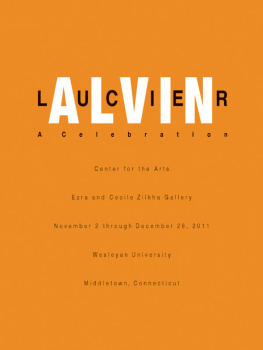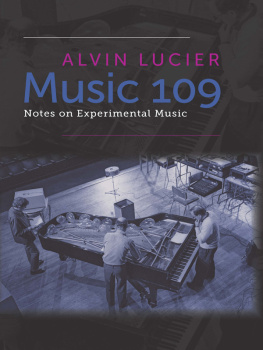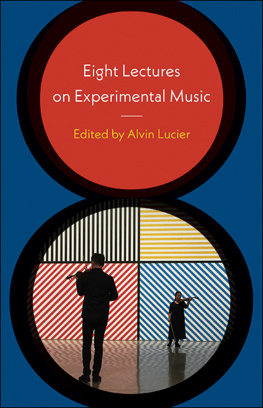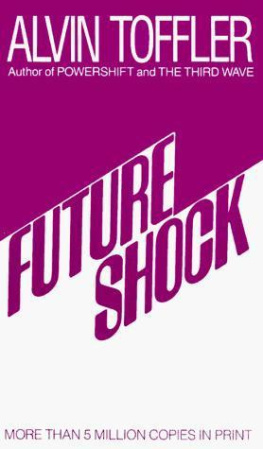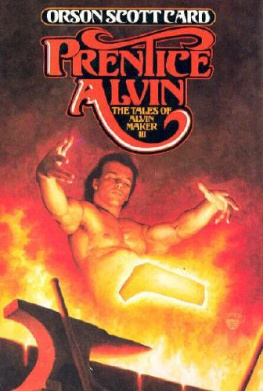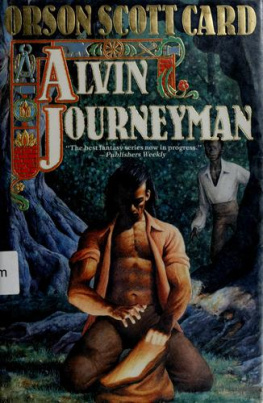Acknowledgments
We gratefully acknowledge the funders whose generosity has made this festival, symposium and exhibition possible, including many departments at Wesleyan University: Academic Affairs, the Allbritton Center for the Study of Public Life, Center for the Arts, the Music Department, the Lemberg Fund, University Relations and Wesleyan University Press.
Many people collaborated to make this celebration possible. In particular, we thank our guest curator, Andrea Miller-Keller, for her expertise and dedication in making the exhibition and this catalog a reality. Thanks are also due to our hard-working colleagues in the Department of Music led by Ron Kuivila and Jane Alden who organized the festival concerts, the symposium and film screenings, and to Su Zheng, Dan St. Clair and Deb Shore who gave them full support; to the industrious CFA staff: Lee Berman (Gallery Manager), John Elmore (who designed the exhibition), Erinn Roos-Brown (who coordinated this publication), Barbara Ally, Kyle Beaudette, Andy Chatfield, Mark Gawlak, Hanna Oravec, Camilla Parente, Bob Russo and CFA Interns Anya Backlund '11, Joanna Bourain '12 and Caitlin Colasacco '11; to Suzy Taraba for her tremendous efforts and Alec McLane and Pat Tully at the Wesleyan University Library; to Suzanna Tamminen (who invited us to produce this catalog) and our colleagues at Wesleyan University Press; to Melissa Datre, Allynn Wilkinson and Philip Issacs at the Wesleyan's ITS New Media Lab; to Clare Rogan, curator of Davison Art Center; to Anne Rhodes, research archivist at Oral History of American Music, Yale University; to Janet Passehl, curator of the LeWitt Collection, and Sofia LeWitt of the LeWitt Estate; and to Jonathan Hiam, curator of American Music, New York Public Library. Our appreciation also to Wesleyan's President Michael Roth, Ron Kuivila and Nic Collins for their important contributions to this catalog, and to Provost Rob Rosenthal and former Dean of the Arts and Humanities Krishna Winston, for their special support. Our gratitude to the designer of this catalog Catherine Waters, whose gift is seen on every page.
Most of all, we thank Alvin for the considerable time, energy and patience he has graciously offered, along with his wife Wendy Stokes, in providing us with the research materials and guidance we needed along the way. (P.T.)
Alvin in Albany
Ronald Kuivila
I first encountered Alvin Lucier in 1972, as a high school student. I attended a SUNY Albany screening of Nam June Paik's A Tribute to John Cage, celebrating Cage's 60th birthday. One feature in this post-Fluxus vaudeville is an interview between WGBH's Russell Connor and Professor Alvin Lucier of Wesleyan University. In the interview, the professor, introduced as an expert on the music of John Cage, expounds knowledgeably, if a bit pedantically, on Cage's work. However, he makes no effortwhatsoeverto control his considerable stutter. The resultant text/sound composition, which includes many minutes of a sibilants never quite moving on to their subsequent vowels, was a bit terrifying for this untutored 16-year-old. But the sentences, when they would finally arrive, were clear, concise and often witty. And there were knowing chuckles from other audience members. So, I was gradually led to realize that all was not as it seemed and that, while the professor was not pretending to stutter, he was electing to stutter. Legend has it that, at the first screening, Cage turned to Alvin and informed him that he had decided he was the only person who should ever be allowed to lecture on his music.
Of course, this wonderfully compressed lesson in experimental music as actions rather than acting, as a sounding rather than a shaping, went mostly over my head. But it was unsettling, provoking and fascinating, and it left a mark. Six months later, when I found the professor's photo in a college catalog, I decided to apply to Wesleyan. It must be one of the most unlikely stories in the annals of college recruiting. Later, as an admit, I came down to Wesleyan and attended a session of Alvin's signature course, Introduction to Experimental Music. He lectured on Vespers, his piece titled after bats of the family Vespertilionidae. He described his fascination with the natural sonar of bats as they echolocate themselves around obstacles and towards food and explained that treating the sound of bats as an objet sonore for tape manipulation seemed irrelevant to his real interest in echolocation itself. He then introduced a Sondol, a kind of sonic flashlight that produces a focused stream of sonic pulses at a variable rate. He explained that the device was intended to enable the blind to use a more refined form of echolocation than is possible with a cane. He then described how Vespers is performed: four musicians are asked to use echolocation to navigate from the corners of the concert space to an agreed location. He immediately acknowledged his own anxiety that the performance instructions were too simple. The originality of the piece and the openness of his disclaimer told a powerful story echoed in just about every other lecture in that introductory course. Those stories have encouraged any number of young composers, artists and choreographers to follow their own paths as artists by asking questions and taking chances.
Alvin's own path into live electronic music was spurred by John Cage's insistence that he contribute a performance of his brain wave piece (ultimately entitled Music for Solo Performer) for a concert featuring the premier of Cage's Rozart Mix. Based on that experience, Lucier has always insisted that his students perform their work, irrespective of their level of confidence. It is more important to make discoveries than to avoid mistakes. From such starting points, Alvin has always been a master of providing small, practical suggestions that gently remove the extraneous choices young composers often make. You can see this at work in the new documentary No Ideas But In Things, previewed during this festival.
Viola Farber remarked that the simple humanity of the performers' actions in Alvin Lucier's live electronic music led her to invite him to be the music director for her dance company. She may have been thinking of the hesitant walk of a performer in Vespers guided only by the subtle changes of an echo. Of course, Vespers also refers to evening prayers of the Catholic liturgy. The outward focus of the performers as they listen for their echoes combines with their slow progression through the space to reinforce a vaguely ecclesiastical feeling, as if evening prayer has become a kind of sonic animism. The sly wit he brings to managing these associations can be discovered in other pieces focused on sound as a spatial phenomenon. In Outlines of Persons and Things a microphone appears to be both a sensor detecting the diffraction patterns of a high-pitched pure tone and a censer diffusing those variations as sonic incense. In Bird And Person Dyning the performer searches for feedback in tune with the call of a birdsong Christmas ornament in order to create different tones that appear to fly around each listener. Wearing a binaural microphone tethered to the sound system and garbed in down vest and duck waders straight from the L.L. Bean catalog, Alvin manages to elide a nature walk and lunar exploration in a manner that is vaguely preposterous but utterly effective.
Alvin commented in one seminar, that he overdid the editing on the LP recording of Vespers and tried to make the piece too musical in a superficial way. This comment captures the creative problem that underlies his work: how to compose musical, but unmannered encounters, with sound. In his live electronic work, this almost invariably involves simple but strikingly original technological configurations or actions. Since the composition of

